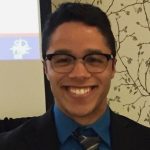Contact tracing program provides real-time learning opportunities for UIndy students, alumni

The coronavirus pandemic has raised awareness of many aspects of healthcare, but perhaps none more so than the area of public health. For Shawn Schweitzer ’20 (Master of Public Health), it has meant applying knowledge from his graduate program as he serves on the University of Indianapolis contact tracing team.

“It is busy, but we are doing important public health work that not only helps protect our students, staff, and faculty, but also our entire community as a whole,” Schweitzer said.
The goal of the University’s contact tracing program is to limit the spread of coronavirus within the campus community by providing support and resources to students and employees who may get sick or exposed to COVID-19. Kirsti Oswalt ’18 (exercise science) ’20 (MPH) will assume the role of contact tracing lead for the University beginning September 8. Oswalt takes the reins from Gurinder Hohl, who recently took on the new position of Chief Executive Officer at the Immigrant Welcome Center.

“I am incredibly excited to be leading the Contact Tracing Team,” Oswalt said. “As a student-athlete, I always wanted to give back to the University to leave a mark, just as the University left a special mark on me. By using my education and knowledge learned in the Public Health program, I will work to keep our students, faculty and staff as safe and healthy as possible.”
Destinee Ward ’21 (Master of Public Health), along with Schweitzer, works around 20 hours per week on the contact tracing team. It is their first professional experience with contact tracing.
“This opportunity is giving me real-world experience along with molding me professionally,” Ward said. “I truly feel blessed to be part of the contact tracing team. I believe that I am impacting so many people and protecting a lot of individuals from becoming another positive case.”
The contact tracing team includes students or recent alumni from the College of Health Sciences and the School of Nursing. All team members have participated in training developed by nationally-recognized organizations such as the Johns Hopkins Bloomberg School of Public Health and Centers for Disease Control and Prevention (CDC). All members of the contact tracing team are also trained to ensure compliance with FERPA and HIPAA guidelines. The training ensures that the University’s contact tracing activities are confidential and protect the privacy of students and employees.
When a student or University employee tests positive for COVID-19, the contact tracing team will speak to the person to determine their recent activity and close contacts. The team then connects with anyone who may have been exposed to advise them that they need to quarantine for 14 days. The team also checks up on people who have tested positive to make sure their recovery is on track.
Together with the daily UIndy Health Check, symptomatic and asymptomatic testing, social distancing and mandating face coverings on campus, contact tracing is an essential part of the University’s efforts to mitigate the spread of the virus. It also comes with a unique set of challenges.
“One major challenge we have faced includes staying updated on what the Indiana State Department of Health and CDC advise. Since COVID-19 continues to change in how we handle it, the best we can do is move along with it and adapt as much as possible,” Schweitzer explained.
“The biggest challenge so far is the number of students I have to call in one day,” Ward added. “Getting to a student before he or she becomes exposed can be very difficult to do. Along with many other challenges, the way I resolve them is by reaching out to my team.”
Both Ward and Schweitzer credit their academic experience at the University of Indianapolis in preparing them to apply their skills in public health successfully.

“My academic program gives me more background information, knowledge and history on why things like contact tracing exist and why this job is so important not only on a college campus but in other work settings as well,” Ward said. “Being a part of public health means you understand that the overall goal is to prevent the spread of disease and improve the quality of life.”
“My UIndy academic program has helped tremendously because having a strong background in public health allows me to think outside the box to solve issues within contact tracing,” Schweitzer added. “This job has helped me stay connected to UIndy and to other health professionals, as well as allow me to practice the leadership and critical thinking skills that will assist me in my new career role within public health.”
Schweitzer also works as the Public Health Preparedness Coordinator for the Northeast Indiana region and is planning for a career in public health preparedness.
“We continue to see the need for preparedness across the world,” he said, “and I am excited to be a part of this field of public health.”
Learn more about the University of Indianapolis’ response to the coronavirus pandemic.
